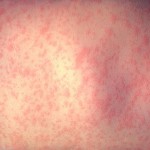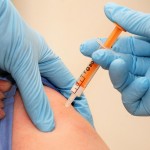Chickenpox is a very common illness that causes a rash and can make you feel generally unwell. It is caused by the varicella-zoster virus, one of the herpes viruses. “Varicella” refers to the initial infection known as chickenpox and “zoster” refers to its reactivation in later life, presenting as shingles.
Chickenpox mainly affects children; more than 90% of people have had it by the age of 15. Most children catch chickenpox in pre-school or early school years, there are outbreaks most years especially in winter and early spring. Once the symptoms have cleared up, the virus remains in the body and is kept at bay by the immune system. At any time later in life the virus can be reactivated, causing shingles. You can’t get shingles from someone that has chickenpox.
Symptoms of chickenpox can include headache, fever, sore throat, backache and a general feeling of being unwell, this is normally the pre-rash phase, then small itchy reddish spots form on the skin surface, normally on the face and scalp first and then spread to the chest, arms and legs. The time from catching the virus to the rash forming is known as the incubation period, it usually takes between 5 and 20 days. The spots go on to form raised papules and can develop into small blisters called vesicles. These then form into pustules which crust over and heal, usually taking a little over 2 weeks.
The spots are usually very itchy. Generally the illness is milder in children than adults. The virus is spread by direct contact with a person who has broken chickenpox blisters, indirect contact with clothes etc. which are infected with fluid leaks from the vesicles, saliva or nasal discharge, and small airborne droplets of infected mucus or fluid. People incubating chickenpox are not infectious immediately and only become so from about 2 days before the rash appears until five days later.
Treatments include eurax or calamine lotion or cream to relieve the itch, antihistamine tablets or liquid help to reduce the skin reaction caused by the virus, paracetamol for fever and headache and sometimes for at-risk groups, antiviral drugs, like acyclovir, are used.
John Duffy MPSI. Claregalway Pharmacy. 091 799 754.



